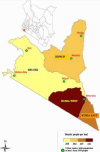Gender-related factors affecting community malaria-related perceptions and practices in Migori County, Kenya
- PMID: 40537755
- PMCID: PMC12180244
- DOI: 10.1186/s12936-025-05336-3
Gender-related factors affecting community malaria-related perceptions and practices in Migori County, Kenya
Abstract
Background: Malaria poses a significant global public health challenge yet there remains limited information on the influence of gender dynamics on malaria programmes despite the well-known gender-specific differentials in the prevalence, transmission and exposure to malaria. The 2024 World Malaria Report indicates that the burden of malaria and the challenges in addressing it remain severe in sub-Saharan Africa (SSA), with eleven countries including Kenya bearing almost two-thirds of the global disease burden. Kenya remains heavily affected, with around 70% of the population at risk. The aim of this paper is to explore how gender-related factors influence malaria healthcare-seeking perceptions and practices in Migori County, a malaria endemic area in Western Kenya.
Methods: The study employed a qualitative research design to gain in-depth insights into local perceptions and practices regarding malaria. Thirty-one in-depth interviews, four gender-stratified focus group discussions, six key informant interviews, and five process mapping exercises. Participants were purposively selected to ensure diversity and data thematically with both inductive and deductive approaches applied to generate themes.
Results: The results of the study are in three main themes; gender-related similarities and differences in malaria healthcare-seeking perceptions; gender differentials in malaria prevention and treatment practices and the gendered dimensions of malaria healthcare-seeking information. Participants were generally aware of malaria, although there were noticeable gaps in their understanding regarding transmission and prevention. Gender related factors including gender dimensions (gender roles and relations); social stratifiers (level of education, gender identity, occupation) and cultural dynamics (beliefs- religion and traditional superstitions) influenced the perceptions of risk and vulnerability. Decision-making was reported as shared in relation to type of treatment and access to care.
Conclusion: The study of community's perceptions reveals that malaria healthcare-seeking, knowledge, attitudes and practices and the perceptions of risk and vulnerability are influenced by gender roles and relations and intersections among socio-demographic factors, beliefs including religion and traditional superstitions, and occupation. Gender disparities in knowledge and healthcare-seeking behaviours illuminated in this study underscore the need for gender-sensitive public health interventions, inclusive health policies and integration of pluralistic health care systems to improve public health outcomes.
Keywords: Gender; Health seeking behaviour; Intersectionality; Malaria; Perceptions; Risks; Vulnerability.
© 2025. The Author(s).
Conflict of interest statement
Declarations. Competing interests: The authors declare no competing interests.
Figures
References
-
- WHO. World malaria report. Geneva: World Health Organization; 2024.
-
- WHO. World malaria report. Geneva: World Health Organization; 2023.
MeSH terms
Grants and funding
LinkOut - more resources
Full Text Sources
Medical
Research Materials


